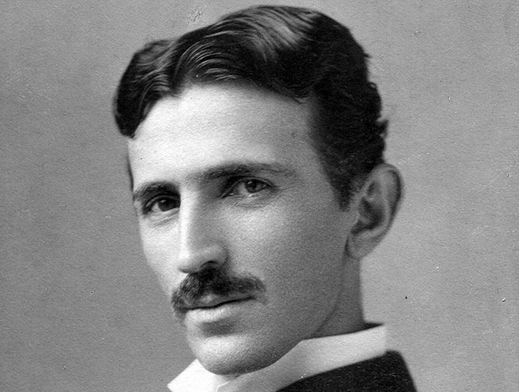
Certain cult historical figures have served as prescient avatars for the techno-visionaries of the digital age. Where the altruistic utopian designs of Buckminster Fuller provided an ideal for the first wave of Silicon Valley pioneers (a group including computer scientist and philosopher Jaron Lanier and Wired editor Kevin Kelly), later entrepreneurs have hewn closer to the principles of brilliant scientist and inventor Nikola Tesla, who believed, as he told Liberty magazine in 1935, that “we suffer the derangement of our civilization because we have not yet completely adjusted ourselves to the machine age.”
Such an adjustment would come, Tesla believed, only in “mastering the machine”—and he seemed to have supreme confidence in human mastery—over food production, climate, and genetics. We would be freed from onerous labor by automation and the creation of “a thinking machine” he said, over a decade before the invention of the computer. Tesla did not anticipate the ways such machines would come to master us, even though he cannily foresaw the future of wireless technology, computing, and telephony, technologies that would radically reshape every aspect of human life.
In an earlier, 1926, interview in Colliers magazine, Tesla predicted, as the editors wrote, communicating “instantly by simple vest-pocket equipment.” His actual words conveyed a much grander, and more accurate, picture of the future.
When wireless is perfectly applied the whole earth will be converted into a huge brain, which in fact it is…. We shall be able to communicate with one another instantly, irrespective of distance. Not only this, but through television and telephony we shall see and hear one another as perfectly as though were face to face, despite intervening distances of thousands of miles; and the instruments through which we shall be able to do this will be amazingly simple compared with our present telephone. A man will be able to carry one in his vest pocket.
The complexity of smart phones far outstrips that of the telephone, but in every other respect, Tesla’s picture maps onto the reality of almost 100 years later. Other aspects of Tesla’s future scenario for wireless also seem to anticipate current technologies, like 3D printing, though the kind he describes still remains in the realm of science fiction: “Wireless will achieve the closer contact through transmission of intelligence, transport of our bodies and materials and conveyance of energy.”
But Tesla’s vision had its limitations, and they lay precisely in his techno-optimism. He never met a problem that wouldn’t eventually have a technological solution (and like many other techno-visionaries of the time, he heartily endorsed state-sponsored eugenics). “The majority of the ills from which humanity suffers,” he said, “are due to the immense extent of the terrestrial globe and the inability of individuals and nations to come into close contact.”
Wireless technology, thought Tesla, would help eradicate war, poverty, disease, pollution, and general discontent, when were are “able to witness and hear events—the inauguration of a President, the playing of a world series game, the havoc of an earthquake or the terror of a battle—just as though we were present.” When international boundaries are “largely obliterated” by instant communication, he believed, “a great step will be made toward the unification and harmonious existence of the various races inhabiting the globe.”
Tesla did not, and perhaps could not, foresee the ways in which technologies that bring us closer together than ever also, and at the same time, pull us ever further apart. Read Tesla’s full interview here, in which he also predicts that women will become the “superior sex,” not by virtue of “the shallow physical imitation of men” but through “the awakening of the intellect.”
Related Content:
Electric Photo of Nikola Tesla, 1899
The Electric Rise and Fall of Nikola Tesla: As Told by Technoillusionist Marco Tempest
The Secret History of Silicon Valley
Josh Jones is a writer and musician based in Durham, NC. Follow him at @jdmagness


Leave a Reply